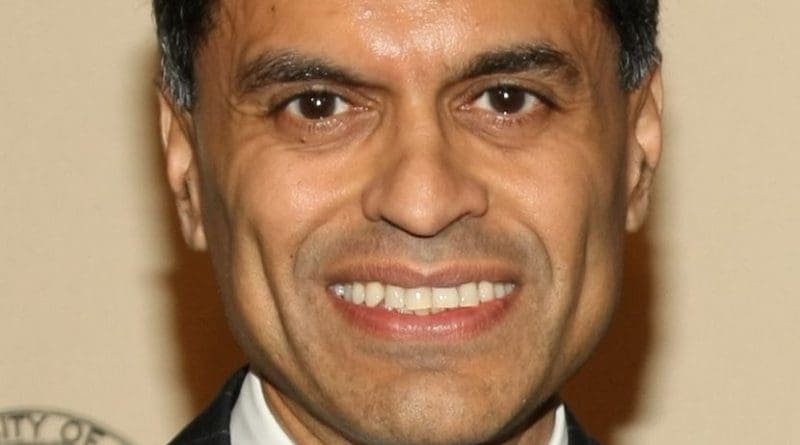Rebuking Zakaria And Goading Trump The Right Way – OpEd
Fareed Zakaria’s comments in a March 28 Washington Post article and like minded monologue on his CNN show GPS of March 31, drew criticism from Democratic Party Hawaii Congresswoman Tulsi Gabbard (who is a 2020 US presidential candidate), Caitlan Johnstone and The Duran. Some additional thoughts on this matter come to mind.
In line with Johnstone, Gabbard and The Duran, it’s not hyperbole to characterize Zakaria as carrying on like a geopolitical shock jock, for goading US President Donald Trump to confront Russia over Venezuela. That take from Zakaria concurs with CNN’s geopolitically correct establishment approach over a balanced presentation. A recent CNN segment on Russia’s Arctic presence serves as one of numerous examples. The image is given of an aggressive Russia in an area where the US is comparatively limited. Never mind noting the overall greater global degree of US military prowess to Russia, with an acknowledgement that the Arctic is (on the whole) geographically more relevant to Russia than the US.
Trump should be rightfully criticized for contradicting the not as aggressive foreign policy (when compared to the neocons and neolibs) which he supported during his presidential campaign. That position has been advocated by Gabbard and Republican Party Kentucky Senator Rand Paul.
Venezuela is a problematical situation, involving an internationally recognized government and opposition – with each having limited support. Omitting some key points, Zakaria exaggerates the Russian military support to the Venezuelan government, while portraying Russian President Vladimir Putin as a troublemaker, seeking to disrupt US interests. There’re several related points which (put mildly) second guess this spin.
The US government has been militarily propping up the anti-Russian leaning Kiev regime with aid and advisers. Ukraine borders Russia. Venezuela doesn’t border the US. If anything, the record shows that Putin has sought better relations with the US, only to face obstacles from the latter.
According to the Stockholm International Peace Research Institute (SIPRI), Russia ranks fourth in military spending behind the US, China and Saudi Arabia. In that category, SIPRI notes that the US spends more on its armed forces than the next seven highest spending countries combined – as America faces challenges with its healthcare, infrastructure, environment and schools.
Zakaria depicts Syria as another country where Russia (as suggested by Zakaria) has pretty much had its way with the US. On the flipside, some in Russia and elsewhere have said that the Russian government has been somewhat passive towards US action in Syria, against the preference of the internationally recognized Syrian government.
With Afghanistan, Iraq and Libya in mind, Venezuela and Syria concern murky situations, which could get worse via adventurist regime change pursuits. On the matter of using military force abroad, the Russian government didn’t seek the regime change route in the 2008 war in the Caucasus (initiated when Georgian forces attacked Russian military personnel and civilians in South Ossetia), as well as Crimea’s 2014 reunification with Russia (following the coup against Ukraine’s democratically elected president) and the civil war in Donbass (whose rebel fighters are overwhelmingly from the territory of the former Ukrainian SSR).
Zakaria is perfectly aware of these points (at least most of them). He exhibits a kind of Jekyll and Hyde approach, which can serve to cover all angles, while at the same time making him look (upon close scrutiny) as being a bit disingenuous. His CNN GPS show is top heavy with the likes of Bret Stephens, Tom Friedman, Richard Haas, Jane Harmon and Anne Marie Slaughter. The counter to such views don’t get anywhere near as much air time on GPS and other CNN shows.
Consider a March 31 aired GPS segment (taped on March 29) Zakaria did with Russian analyst Andrey Kortunov, who explained Russia’s relationship with Venezuela along the lines of what’s noted in this essay. In this particular exchange, Zakaria doesn’t offer any disagreement to what Kortunov said. As if that segment never existed, Zakaria, in his high profile GPS monologue and Washington Post article, resorts to the simplistic rant of a xenophobic, big power chauvinist. Just the kind of journalism typically not getting called out within US mass media.
As of this writing, Fox News host Tucker Carlson hasn’t responded to Zakaria goading Trump to confront Russia. Concerning Russia related issues, Carlson remains the most even handed among his 24/7 US cable TV news peers. On the Fox Business Network (a Fox News affiliate) Lou Dobbs’ April 5 segment with Jack Keane (at about the 26:35 mark of this video) has the facile inaccuracies which are frequently presented on CNN and MSNBC.
Michael Averko is a New York based independent foreign policy analyst and media critic. This article was initially placed at the Strategic Culture Foundation’s website on April 10.

